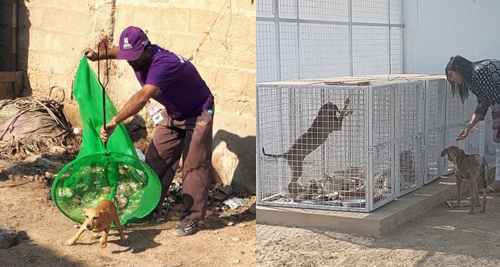Hundreds of cases of dog bites occur each day in the city of Karachi and its surroundings – a figure that doctors say may be underreported.
At the city’s Indus Hospital – a private health facility located in an area of almost 2.5 million under-served populations – a Rabies Prevention Clinic has been set up and is being funded entirely through public donations. The hospital offers high-quality care to all patients free of charge.

“Dog bites are common in Karachi and we alone treat more than 300 suspected rabid cases each month,” says Dr Naseem Salahuddin, an infectious disease specialist at the hospital. “The wound is first washed thoroughly for 15 minutes with soap and water and is disinfected, and then a series of vaccinations are administered. In severe cases, rabies immunoglobulin is administered into the wound.”
“Unfortunately, for many bite-victims it is far too late as they already show onset of rabies symptoms by the time they reach here – which means a certain death sentence,” she says with emotion in her voice. “It is heart breaking to tell parents that their child will be dead by the next day.”
Determination and community engagement
Having witnessed so many tragic deaths for more than three decades, Dr Salahuddin argued that simply focusing on post-exposure treatment is not sufficient. Eliminating dog-mediated human rabies requires a coordinated approach to tackle the problem at its source through the One Health approach advocated by WHO.
Dr Salahuddin studied local data and concluded that most dog bite victims come from a fishing village called Ibrahim Hyderi on the Arabian Sea creek. The village is heavily populated and hugely underserved. While studying case history, Dr Salahuddin found that in many cases, 5–15 people were bitten by one dog, making it highly likely that the dog was rabid.
The village has schools, mosques and clinics; many shops sell fishnets and other fishing necessities. The narrow lanes are strewn with garbage and a pervasive smell of fish is in the air. Stray dogs feed off the discarded food, and most appear to be reasonably well fed and not aggressive. Some lie lazily under pushcarts or at doorsteps of homes.
For the most part humans and dogs seem to live in harmony, but the villagers tell us the dogs generally come together in packs at night or during the early hours of the morning, and that children chase or tease them, provoking bites. One villager tells us how a child was mauled to death, and at least two remember, sadly, the deaths of several children from rabies.
Dr Salahuddin and her team met some village elders to explain about engaging them to support a pilot project called Rabies Free Karachi – which, through a humane approach, aims to vaccinate and sterilize stray dogs on a large scale, while creating public awareness of dog behaviour and rabies.
“The elders seemed reluctant at first but they gradually understood the well-meaning nature of the project,” said Mr Aftab Gauhar, Project Manager of Rabies Free Karachi. “After a few days they even hosted us in the town hall for subsequent meetings with local leaders.”
Support
The project has strong support from the Mayor of Karachi, Waseem Akhtar, philanthropists, local animal welfare groups, private veterinarians and civil society. A philanthropic businessman donated a 20 foot container, which was improvised for use as an operating theatre and equipped with air conditioning, water supply, drainage, lights and fans.
The Ibrahim Hyderi Union Council approved the use of an open space to run the project and facilitated the provision of utilities and security. Kennels and cages were installed, and a van was purchased to transport dogs to the treatment facility.
Dr Bernadette Abela-Ridder, Team Leader of WHO’s Neglected Zoonoses Diseases unit, has pledged support to provide animal rabies vaccines free of charge. WHO is also sponsoring an animal behaviourist, Mr Daniel Stewart, from South Africa and is funding a two-week workshop aimed at providing training on how to capture and vaccinate stray dogs. Training has also been provided to newly graduated veterinarians inside the operating theatre.
“There is a dearth of practical experience for neutering or spaying among junior vets,” says Dr Isma Gheewala, a well-known and experienced surgical veterinarian. “My contribution to society is to train vets not just for this project but also to increase the number of trainees in order to serve larger populations. I want to give something back to society.”
“Before Daniel came, I did not understand what this was all about, but now I am going to tell the whole village that you should not hurt animals, you should love and take care of them,” said one of the trainees who can now perform mass dog vaccination expertly. “He is a wonderful person and trainer”.
“I want to see zero dog bites or rabies in Ibrahim Hyderi and, Inshallah, we will extend the programme very soon to other parts of Karachi,” said Mr Aftab Gauhar. He is fully determined to do so.
It is expected that Rabies Free Karachi will be emulated by other cities and disseminated nationwide. The lesson is to make people realize that culling is not the solution to eliminate rabies but rather to keep their streets clean by supporting such projects and to save their own village from all forms of infectious diseases.
The task has only just begun. The real work will be to sustain the fight against rabies in the selected area.
With continued support from the city government, communities and civil society, the project hopes to expand to other locations and make Karachi free from rabies.
